Stress and Mental Health in Adolescents
VerifiedAdded on 2020/01/23
|9
|3161
|50
Essay
AI Summary
This assignment delves into the complex relationship between negative life events and mental health in adolescents. Students analyze research findings on how stressful experiences can influence well-being, exploring factors like timing of events, coping strategies, and the role of social support. The assignment utilizes various academic sources to provide a comprehensive understanding of this critical topic.
Contribute Materials
Your contribution can guide someone’s learning journey. Share your
documents today.
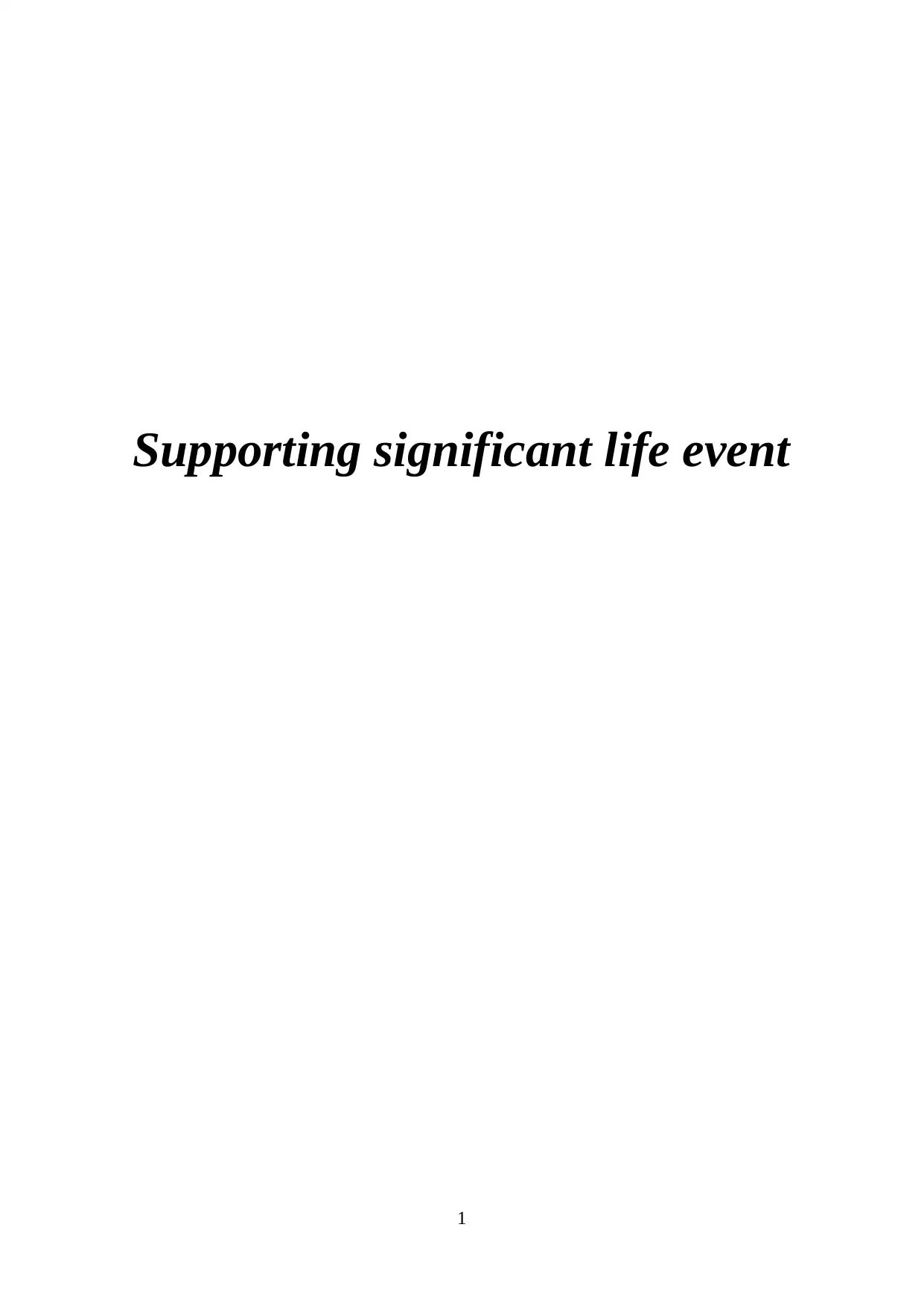
Supporting significant life event
1
1
Secure Best Marks with AI Grader
Need help grading? Try our AI Grader for instant feedback on your assignments.
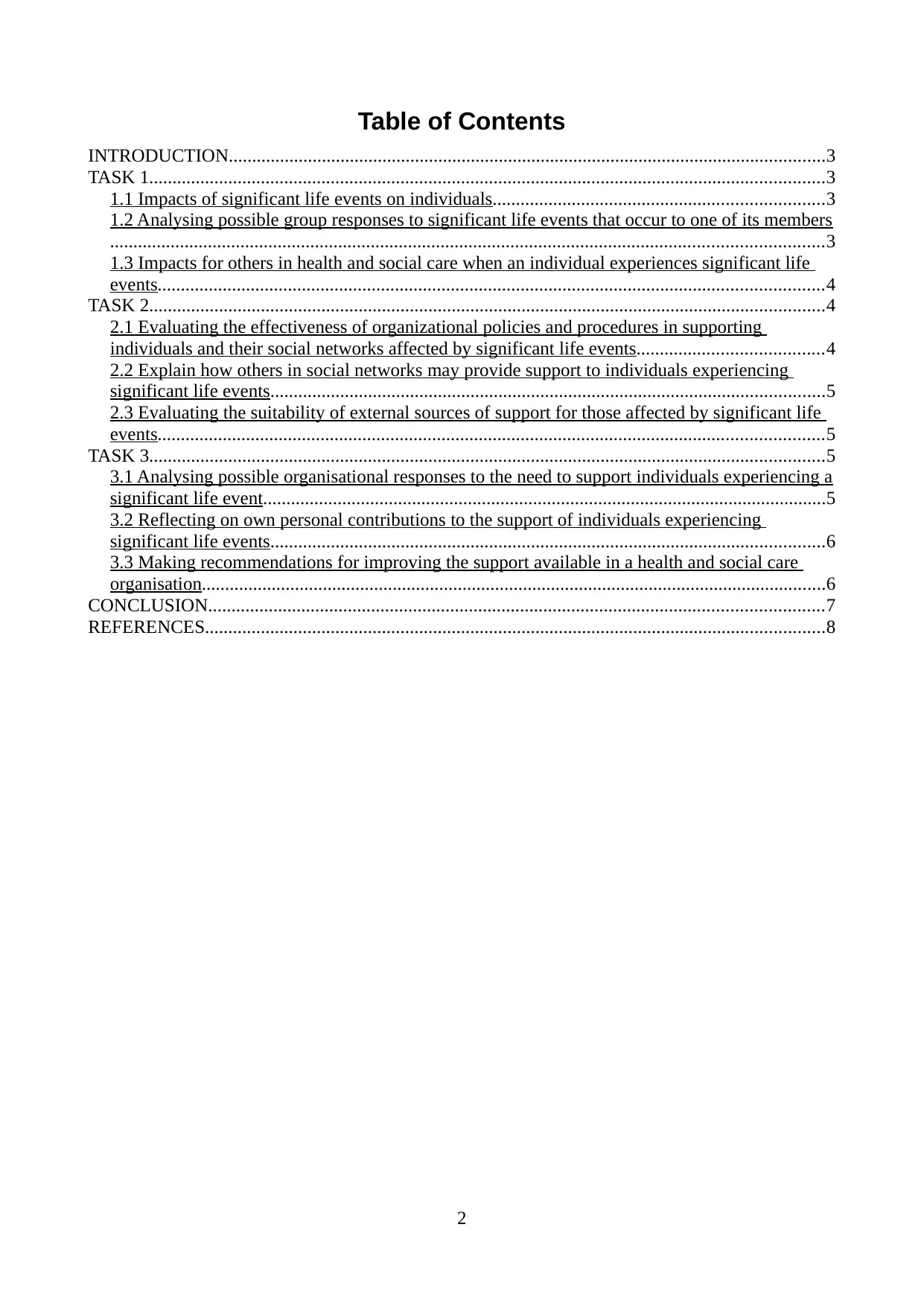
Table of Contents
INTRODUCTION................................................................................................................................3
TASK 1.................................................................................................................................................3
1.1 Impacts of significant life events on individuals.......................................................................3
1.2 Analysing possible group responses to significant life events that occur to one of its members
.........................................................................................................................................................3
1.3 Impacts for others in health and social care when an individual experiences significant life
events...............................................................................................................................................4
TASK 2.................................................................................................................................................4
2.1 Evaluating the effectiveness of organizational policies and procedures in supporting
individuals and their social networks affected by significant life events........................................4
2.2 Explain how others in social networks may provide support to individuals experiencing
significant life events.......................................................................................................................5
2.3 Evaluating the suitability of external sources of support for those affected by significant life
events...............................................................................................................................................5
TASK 3.................................................................................................................................................5
3.1 Analysing possible organisational responses to the need to support individuals experiencing a
significant life event.........................................................................................................................5
3.2 Reflecting on own personal contributions to the support of individuals experiencing
significant life events.......................................................................................................................6
3.3 Making recommendations for improving the support available in a health and social care
organisation......................................................................................................................................6
CONCLUSION....................................................................................................................................7
REFERENCES.....................................................................................................................................8
2
INTRODUCTION................................................................................................................................3
TASK 1.................................................................................................................................................3
1.1 Impacts of significant life events on individuals.......................................................................3
1.2 Analysing possible group responses to significant life events that occur to one of its members
.........................................................................................................................................................3
1.3 Impacts for others in health and social care when an individual experiences significant life
events...............................................................................................................................................4
TASK 2.................................................................................................................................................4
2.1 Evaluating the effectiveness of organizational policies and procedures in supporting
individuals and their social networks affected by significant life events........................................4
2.2 Explain how others in social networks may provide support to individuals experiencing
significant life events.......................................................................................................................5
2.3 Evaluating the suitability of external sources of support for those affected by significant life
events...............................................................................................................................................5
TASK 3.................................................................................................................................................5
3.1 Analysing possible organisational responses to the need to support individuals experiencing a
significant life event.........................................................................................................................5
3.2 Reflecting on own personal contributions to the support of individuals experiencing
significant life events.......................................................................................................................6
3.3 Making recommendations for improving the support available in a health and social care
organisation......................................................................................................................................6
CONCLUSION....................................................................................................................................7
REFERENCES.....................................................................................................................................8
2
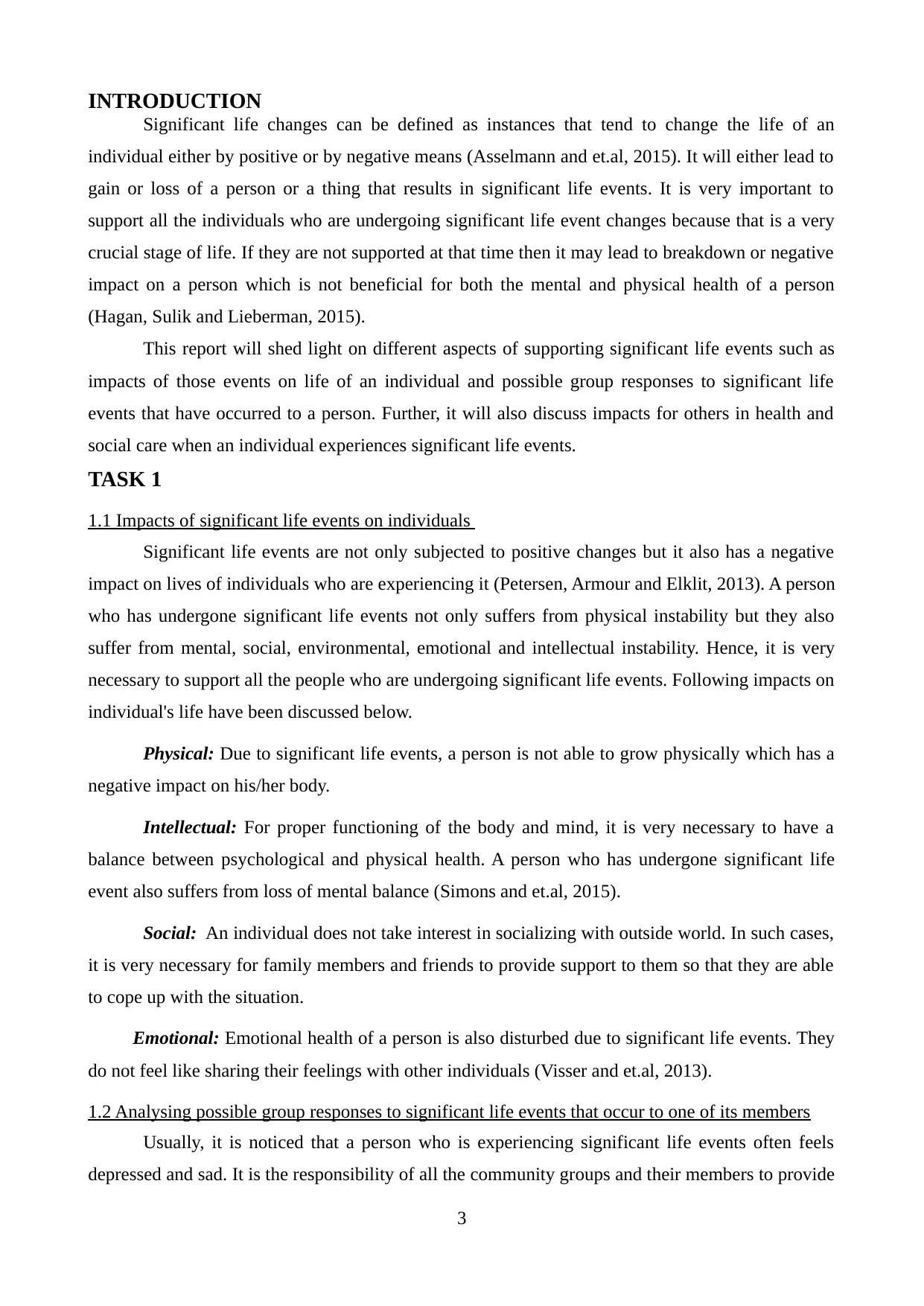
INTRODUCTION
Significant life changes can be defined as instances that tend to change the life of an
individual either by positive or by negative means (Asselmann and et.al, 2015). It will either lead to
gain or loss of a person or a thing that results in significant life events. It is very important to
support all the individuals who are undergoing significant life event changes because that is a very
crucial stage of life. If they are not supported at that time then it may lead to breakdown or negative
impact on a person which is not beneficial for both the mental and physical health of a person
(Hagan, Sulik and Lieberman, 2015).
This report will shed light on different aspects of supporting significant life events such as
impacts of those events on life of an individual and possible group responses to significant life
events that have occurred to a person. Further, it will also discuss impacts for others in health and
social care when an individual experiences significant life events.
TASK 1
1.1 Impacts of significant life events on individuals
Significant life events are not only subjected to positive changes but it also has a negative
impact on lives of individuals who are experiencing it (Petersen, Armour and Elklit, 2013). A person
who has undergone significant life events not only suffers from physical instability but they also
suffer from mental, social, environmental, emotional and intellectual instability. Hence, it is very
necessary to support all the people who are undergoing significant life events. Following impacts on
individual's life have been discussed below.
Physical: Due to significant life events, a person is not able to grow physically which has a
negative impact on his/her body.
Intellectual: For proper functioning of the body and mind, it is very necessary to have a
balance between psychological and physical health. A person who has undergone significant life
event also suffers from loss of mental balance (Simons and et.al, 2015).
Social: An individual does not take interest in socializing with outside world. In such cases,
it is very necessary for family members and friends to provide support to them so that they are able
to cope up with the situation.
Emotional: Emotional health of a person is also disturbed due to significant life events. They
do not feel like sharing their feelings with other individuals (Visser and et.al, 2013).
1.2 Analysing possible group responses to significant life events that occur to one of its members
Usually, it is noticed that a person who is experiencing significant life events often feels
depressed and sad. It is the responsibility of all the community groups and their members to provide
3
Significant life changes can be defined as instances that tend to change the life of an
individual either by positive or by negative means (Asselmann and et.al, 2015). It will either lead to
gain or loss of a person or a thing that results in significant life events. It is very important to
support all the individuals who are undergoing significant life event changes because that is a very
crucial stage of life. If they are not supported at that time then it may lead to breakdown or negative
impact on a person which is not beneficial for both the mental and physical health of a person
(Hagan, Sulik and Lieberman, 2015).
This report will shed light on different aspects of supporting significant life events such as
impacts of those events on life of an individual and possible group responses to significant life
events that have occurred to a person. Further, it will also discuss impacts for others in health and
social care when an individual experiences significant life events.
TASK 1
1.1 Impacts of significant life events on individuals
Significant life events are not only subjected to positive changes but it also has a negative
impact on lives of individuals who are experiencing it (Petersen, Armour and Elklit, 2013). A person
who has undergone significant life events not only suffers from physical instability but they also
suffer from mental, social, environmental, emotional and intellectual instability. Hence, it is very
necessary to support all the people who are undergoing significant life events. Following impacts on
individual's life have been discussed below.
Physical: Due to significant life events, a person is not able to grow physically which has a
negative impact on his/her body.
Intellectual: For proper functioning of the body and mind, it is very necessary to have a
balance between psychological and physical health. A person who has undergone significant life
event also suffers from loss of mental balance (Simons and et.al, 2015).
Social: An individual does not take interest in socializing with outside world. In such cases,
it is very necessary for family members and friends to provide support to them so that they are able
to cope up with the situation.
Emotional: Emotional health of a person is also disturbed due to significant life events. They
do not feel like sharing their feelings with other individuals (Visser and et.al, 2013).
1.2 Analysing possible group responses to significant life events that occur to one of its members
Usually, it is noticed that a person who is experiencing significant life events often feels
depressed and sad. It is the responsibility of all the community groups and their members to provide
3
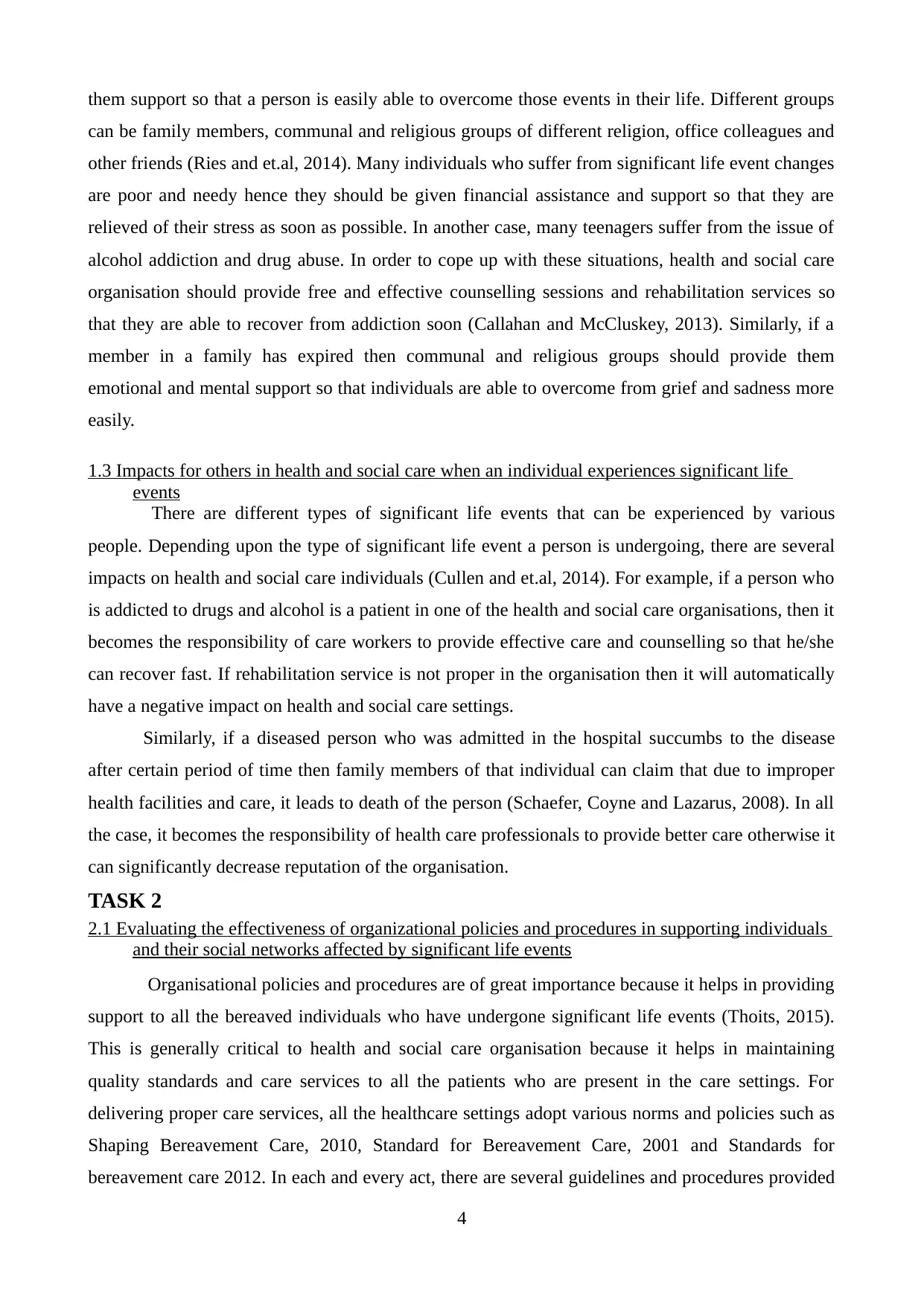
them support so that a person is easily able to overcome those events in their life. Different groups
can be family members, communal and religious groups of different religion, office colleagues and
other friends (Ries and et.al, 2014). Many individuals who suffer from significant life event changes
are poor and needy hence they should be given financial assistance and support so that they are
relieved of their stress as soon as possible. In another case, many teenagers suffer from the issue of
alcohol addiction and drug abuse. In order to cope up with these situations, health and social care
organisation should provide free and effective counselling sessions and rehabilitation services so
that they are able to recover from addiction soon (Callahan and McCluskey, 2013). Similarly, if a
member in a family has expired then communal and religious groups should provide them
emotional and mental support so that individuals are able to overcome from grief and sadness more
easily.
1.3 Impacts for others in health and social care when an individual experiences significant life
events
There are different types of significant life events that can be experienced by various
people. Depending upon the type of significant life event a person is undergoing, there are several
impacts on health and social care individuals (Cullen and et.al, 2014). For example, if a person who
is addicted to drugs and alcohol is a patient in one of the health and social care organisations, then it
becomes the responsibility of care workers to provide effective care and counselling so that he/she
can recover fast. If rehabilitation service is not proper in the organisation then it will automatically
have a negative impact on health and social care settings.
Similarly, if a diseased person who was admitted in the hospital succumbs to the disease
after certain period of time then family members of that individual can claim that due to improper
health facilities and care, it leads to death of the person (Schaefer, Coyne and Lazarus, 2008). In all
the case, it becomes the responsibility of health care professionals to provide better care otherwise it
can significantly decrease reputation of the organisation.
TASK 2
2.1 Evaluating the effectiveness of organizational policies and procedures in supporting individuals
and their social networks affected by significant life events
Organisational policies and procedures are of great importance because it helps in providing
support to all the bereaved individuals who have undergone significant life events (Thoits, 2015).
This is generally critical to health and social care organisation because it helps in maintaining
quality standards and care services to all the patients who are present in the care settings. For
delivering proper care services, all the healthcare settings adopt various norms and policies such as
Shaping Bereavement Care, 2010, Standard for Bereavement Care, 2001 and Standards for
bereavement care 2012. In each and every act, there are several guidelines and procedures provided
4
can be family members, communal and religious groups of different religion, office colleagues and
other friends (Ries and et.al, 2014). Many individuals who suffer from significant life event changes
are poor and needy hence they should be given financial assistance and support so that they are
relieved of their stress as soon as possible. In another case, many teenagers suffer from the issue of
alcohol addiction and drug abuse. In order to cope up with these situations, health and social care
organisation should provide free and effective counselling sessions and rehabilitation services so
that they are able to recover from addiction soon (Callahan and McCluskey, 2013). Similarly, if a
member in a family has expired then communal and religious groups should provide them
emotional and mental support so that individuals are able to overcome from grief and sadness more
easily.
1.3 Impacts for others in health and social care when an individual experiences significant life
events
There are different types of significant life events that can be experienced by various
people. Depending upon the type of significant life event a person is undergoing, there are several
impacts on health and social care individuals (Cullen and et.al, 2014). For example, if a person who
is addicted to drugs and alcohol is a patient in one of the health and social care organisations, then it
becomes the responsibility of care workers to provide effective care and counselling so that he/she
can recover fast. If rehabilitation service is not proper in the organisation then it will automatically
have a negative impact on health and social care settings.
Similarly, if a diseased person who was admitted in the hospital succumbs to the disease
after certain period of time then family members of that individual can claim that due to improper
health facilities and care, it leads to death of the person (Schaefer, Coyne and Lazarus, 2008). In all
the case, it becomes the responsibility of health care professionals to provide better care otherwise it
can significantly decrease reputation of the organisation.
TASK 2
2.1 Evaluating the effectiveness of organizational policies and procedures in supporting individuals
and their social networks affected by significant life events
Organisational policies and procedures are of great importance because it helps in providing
support to all the bereaved individuals who have undergone significant life events (Thoits, 2015).
This is generally critical to health and social care organisation because it helps in maintaining
quality standards and care services to all the patients who are present in the care settings. For
delivering proper care services, all the healthcare settings adopt various norms and policies such as
Shaping Bereavement Care, 2010, Standard for Bereavement Care, 2001 and Standards for
bereavement care 2012. In each and every act, there are several guidelines and procedures provided
4
Secure Best Marks with AI Grader
Need help grading? Try our AI Grader for instant feedback on your assignments.
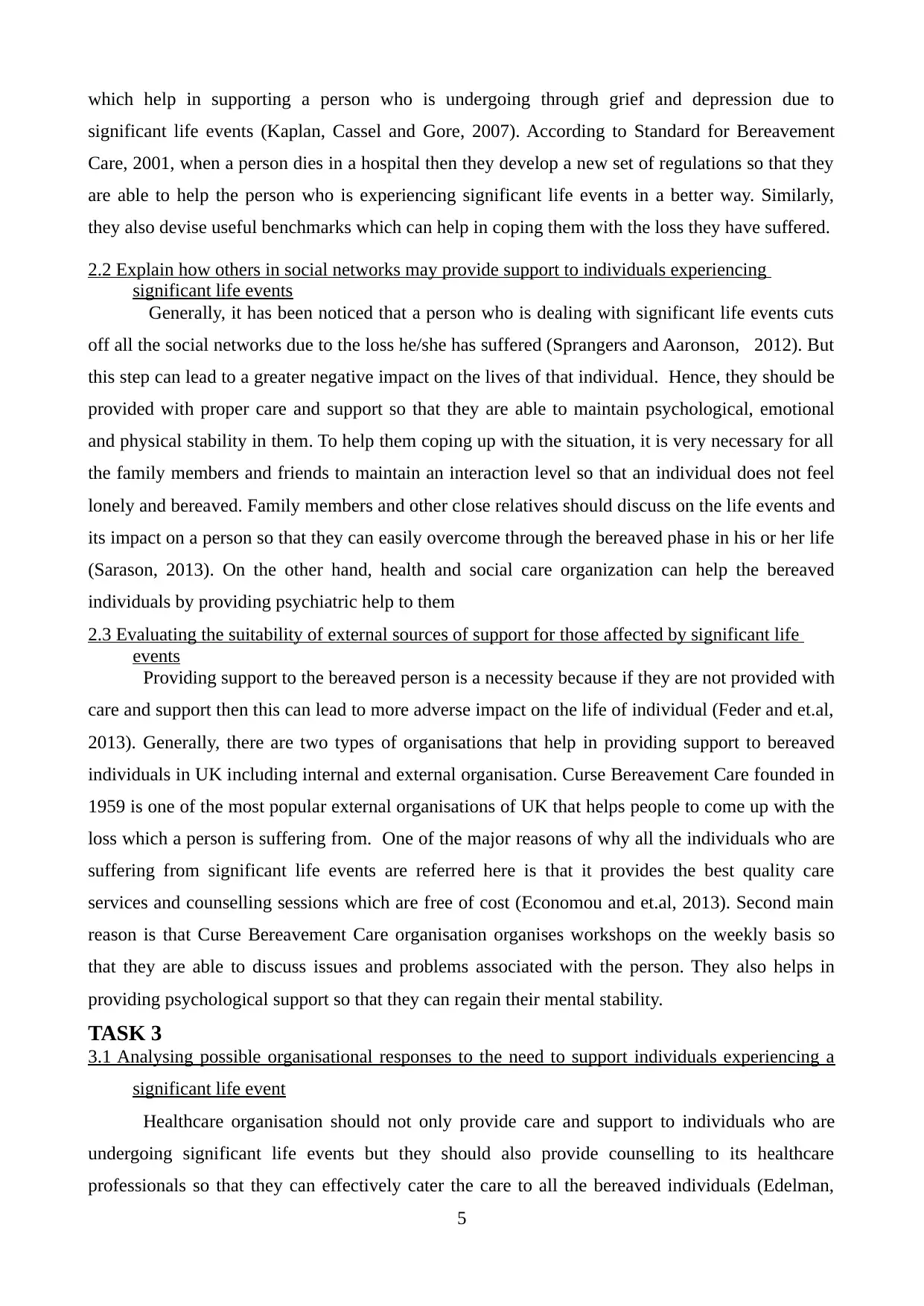
which help in supporting a person who is undergoing through grief and depression due to
significant life events (Kaplan, Cassel and Gore, 2007). According to Standard for Bereavement
Care, 2001, when a person dies in a hospital then they develop a new set of regulations so that they
are able to help the person who is experiencing significant life events in a better way. Similarly,
they also devise useful benchmarks which can help in coping them with the loss they have suffered.
2.2 Explain how others in social networks may provide support to individuals experiencing
significant life events
Generally, it has been noticed that a person who is dealing with significant life events cuts
off all the social networks due to the loss he/she has suffered (Sprangers and Aaronson, 2012). But
this step can lead to a greater negative impact on the lives of that individual. Hence, they should be
provided with proper care and support so that they are able to maintain psychological, emotional
and physical stability in them. To help them coping up with the situation, it is very necessary for all
the family members and friends to maintain an interaction level so that an individual does not feel
lonely and bereaved. Family members and other close relatives should discuss on the life events and
its impact on a person so that they can easily overcome through the bereaved phase in his or her life
(Sarason, 2013). On the other hand, health and social care organization can help the bereaved
individuals by providing psychiatric help to them
2.3 Evaluating the suitability of external sources of support for those affected by significant life
events
Providing support to the bereaved person is a necessity because if they are not provided with
care and support then this can lead to more adverse impact on the life of individual (Feder and et.al,
2013). Generally, there are two types of organisations that help in providing support to bereaved
individuals in UK including internal and external organisation. Curse Bereavement Care founded in
1959 is one of the most popular external organisations of UK that helps people to come up with the
loss which a person is suffering from. One of the major reasons of why all the individuals who are
suffering from significant life events are referred here is that it provides the best quality care
services and counselling sessions which are free of cost (Economou and et.al, 2013). Second main
reason is that Curse Bereavement Care organisation organises workshops on the weekly basis so
that they are able to discuss issues and problems associated with the person. They also helps in
providing psychological support so that they can regain their mental stability.
TASK 3
3.1 Analysing possible organisational responses to the need to support individuals experiencing a
significant life event
Healthcare organisation should not only provide care and support to individuals who are
undergoing significant life events but they should also provide counselling to its healthcare
professionals so that they can effectively cater the care to all the bereaved individuals (Edelman,
5
significant life events (Kaplan, Cassel and Gore, 2007). According to Standard for Bereavement
Care, 2001, when a person dies in a hospital then they develop a new set of regulations so that they
are able to help the person who is experiencing significant life events in a better way. Similarly,
they also devise useful benchmarks which can help in coping them with the loss they have suffered.
2.2 Explain how others in social networks may provide support to individuals experiencing
significant life events
Generally, it has been noticed that a person who is dealing with significant life events cuts
off all the social networks due to the loss he/she has suffered (Sprangers and Aaronson, 2012). But
this step can lead to a greater negative impact on the lives of that individual. Hence, they should be
provided with proper care and support so that they are able to maintain psychological, emotional
and physical stability in them. To help them coping up with the situation, it is very necessary for all
the family members and friends to maintain an interaction level so that an individual does not feel
lonely and bereaved. Family members and other close relatives should discuss on the life events and
its impact on a person so that they can easily overcome through the bereaved phase in his or her life
(Sarason, 2013). On the other hand, health and social care organization can help the bereaved
individuals by providing psychiatric help to them
2.3 Evaluating the suitability of external sources of support for those affected by significant life
events
Providing support to the bereaved person is a necessity because if they are not provided with
care and support then this can lead to more adverse impact on the life of individual (Feder and et.al,
2013). Generally, there are two types of organisations that help in providing support to bereaved
individuals in UK including internal and external organisation. Curse Bereavement Care founded in
1959 is one of the most popular external organisations of UK that helps people to come up with the
loss which a person is suffering from. One of the major reasons of why all the individuals who are
suffering from significant life events are referred here is that it provides the best quality care
services and counselling sessions which are free of cost (Economou and et.al, 2013). Second main
reason is that Curse Bereavement Care organisation organises workshops on the weekly basis so
that they are able to discuss issues and problems associated with the person. They also helps in
providing psychological support so that they can regain their mental stability.
TASK 3
3.1 Analysing possible organisational responses to the need to support individuals experiencing a
significant life event
Healthcare organisation should not only provide care and support to individuals who are
undergoing significant life events but they should also provide counselling to its healthcare
professionals so that they can effectively cater the care to all the bereaved individuals (Edelman,
5
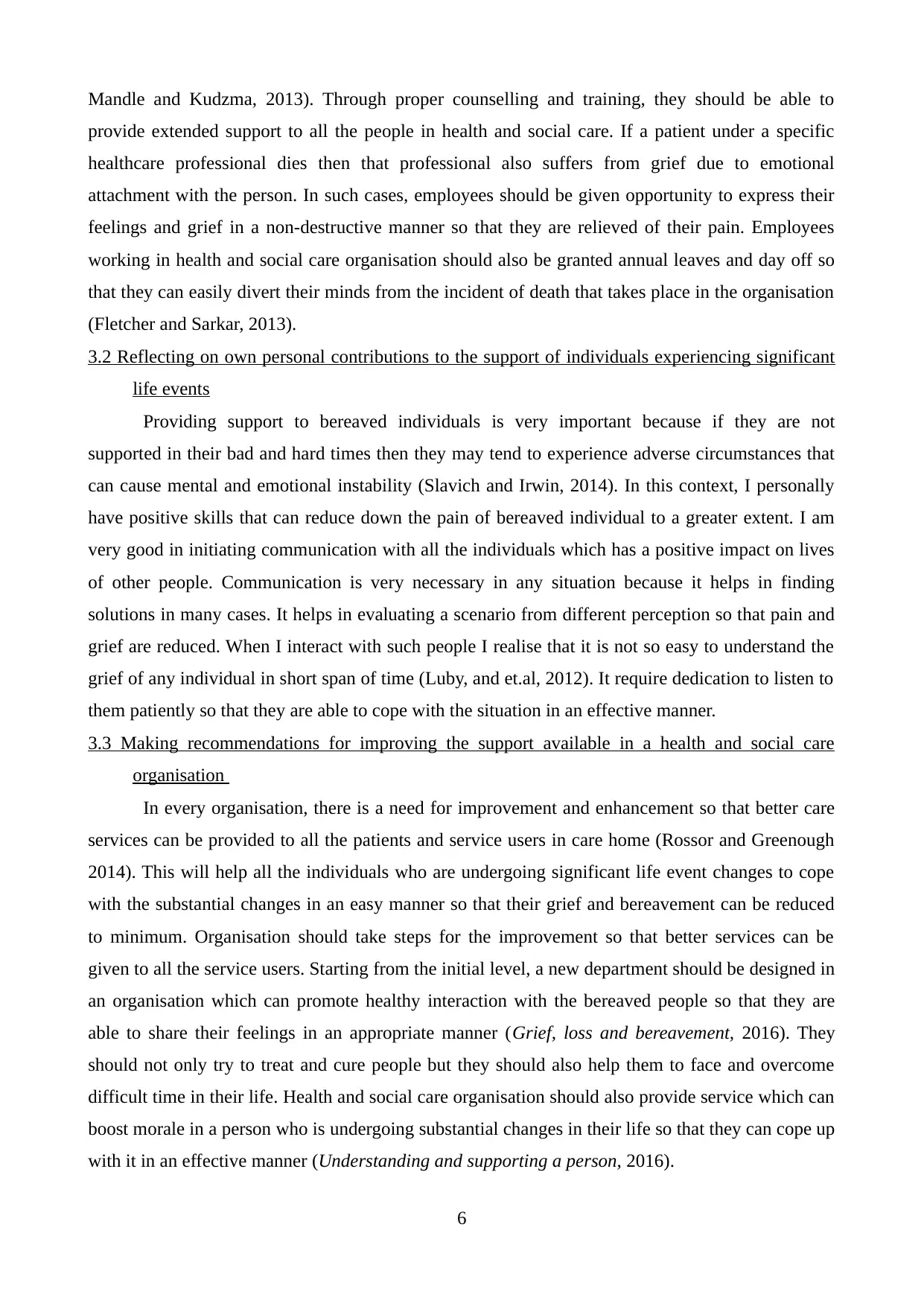
Mandle and Kudzma, 2013). Through proper counselling and training, they should be able to
provide extended support to all the people in health and social care. If a patient under a specific
healthcare professional dies then that professional also suffers from grief due to emotional
attachment with the person. In such cases, employees should be given opportunity to express their
feelings and grief in a non-destructive manner so that they are relieved of their pain. Employees
working in health and social care organisation should also be granted annual leaves and day off so
that they can easily divert their minds from the incident of death that takes place in the organisation
(Fletcher and Sarkar, 2013).
3.2 Reflecting on own personal contributions to the support of individuals experiencing significant
life events
Providing support to bereaved individuals is very important because if they are not
supported in their bad and hard times then they may tend to experience adverse circumstances that
can cause mental and emotional instability (Slavich and Irwin, 2014). In this context, I personally
have positive skills that can reduce down the pain of bereaved individual to a greater extent. I am
very good in initiating communication with all the individuals which has a positive impact on lives
of other people. Communication is very necessary in any situation because it helps in finding
solutions in many cases. It helps in evaluating a scenario from different perception so that pain and
grief are reduced. When I interact with such people I realise that it is not so easy to understand the
grief of any individual in short span of time (Luby, and et.al, 2012). It require dedication to listen to
them patiently so that they are able to cope with the situation in an effective manner.
3.3 Making recommendations for improving the support available in a health and social care
organisation
In every organisation, there is a need for improvement and enhancement so that better care
services can be provided to all the patients and service users in care home (Rossor and Greenough
2014). This will help all the individuals who are undergoing significant life event changes to cope
with the substantial changes in an easy manner so that their grief and bereavement can be reduced
to minimum. Organisation should take steps for the improvement so that better services can be
given to all the service users. Starting from the initial level, a new department should be designed in
an organisation which can promote healthy interaction with the bereaved people so that they are
able to share their feelings in an appropriate manner (Grief, loss and bereavement, 2016). They
should not only try to treat and cure people but they should also help them to face and overcome
difficult time in their life. Health and social care organisation should also provide service which can
boost morale in a person who is undergoing substantial changes in their life so that they can cope up
with it in an effective manner (Understanding and supporting a person, 2016).
6
provide extended support to all the people in health and social care. If a patient under a specific
healthcare professional dies then that professional also suffers from grief due to emotional
attachment with the person. In such cases, employees should be given opportunity to express their
feelings and grief in a non-destructive manner so that they are relieved of their pain. Employees
working in health and social care organisation should also be granted annual leaves and day off so
that they can easily divert their minds from the incident of death that takes place in the organisation
(Fletcher and Sarkar, 2013).
3.2 Reflecting on own personal contributions to the support of individuals experiencing significant
life events
Providing support to bereaved individuals is very important because if they are not
supported in their bad and hard times then they may tend to experience adverse circumstances that
can cause mental and emotional instability (Slavich and Irwin, 2014). In this context, I personally
have positive skills that can reduce down the pain of bereaved individual to a greater extent. I am
very good in initiating communication with all the individuals which has a positive impact on lives
of other people. Communication is very necessary in any situation because it helps in finding
solutions in many cases. It helps in evaluating a scenario from different perception so that pain and
grief are reduced. When I interact with such people I realise that it is not so easy to understand the
grief of any individual in short span of time (Luby, and et.al, 2012). It require dedication to listen to
them patiently so that they are able to cope with the situation in an effective manner.
3.3 Making recommendations for improving the support available in a health and social care
organisation
In every organisation, there is a need for improvement and enhancement so that better care
services can be provided to all the patients and service users in care home (Rossor and Greenough
2014). This will help all the individuals who are undergoing significant life event changes to cope
with the substantial changes in an easy manner so that their grief and bereavement can be reduced
to minimum. Organisation should take steps for the improvement so that better services can be
given to all the service users. Starting from the initial level, a new department should be designed in
an organisation which can promote healthy interaction with the bereaved people so that they are
able to share their feelings in an appropriate manner (Grief, loss and bereavement, 2016). They
should not only try to treat and cure people but they should also help them to face and overcome
difficult time in their life. Health and social care organisation should also provide service which can
boost morale in a person who is undergoing substantial changes in their life so that they can cope up
with it in an effective manner (Understanding and supporting a person, 2016).
6
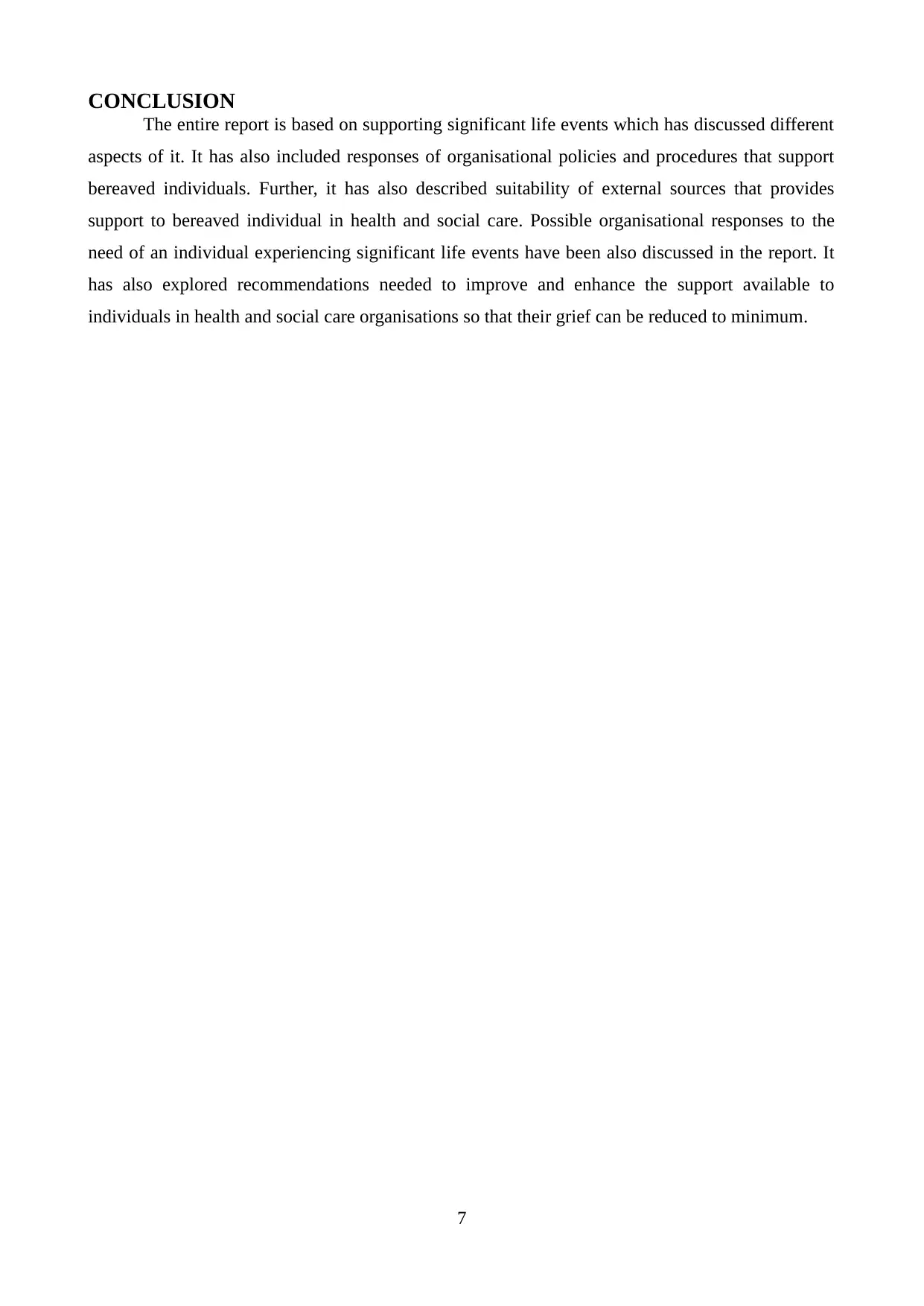
CONCLUSION
The entire report is based on supporting significant life events which has discussed different
aspects of it. It has also included responses of organisational policies and procedures that support
bereaved individuals. Further, it has also described suitability of external sources that provides
support to bereaved individual in health and social care. Possible organisational responses to the
need of an individual experiencing significant life events have been also discussed in the report. It
has also explored recommendations needed to improve and enhance the support available to
individuals in health and social care organisations so that their grief can be reduced to minimum.
7
The entire report is based on supporting significant life events which has discussed different
aspects of it. It has also included responses of organisational policies and procedures that support
bereaved individuals. Further, it has also described suitability of external sources that provides
support to bereaved individual in health and social care. Possible organisational responses to the
need of an individual experiencing significant life events have been also discussed in the report. It
has also explored recommendations needed to improve and enhance the support available to
individuals in health and social care organisations so that their grief can be reduced to minimum.
7
Paraphrase This Document
Need a fresh take? Get an instant paraphrase of this document with our AI Paraphraser
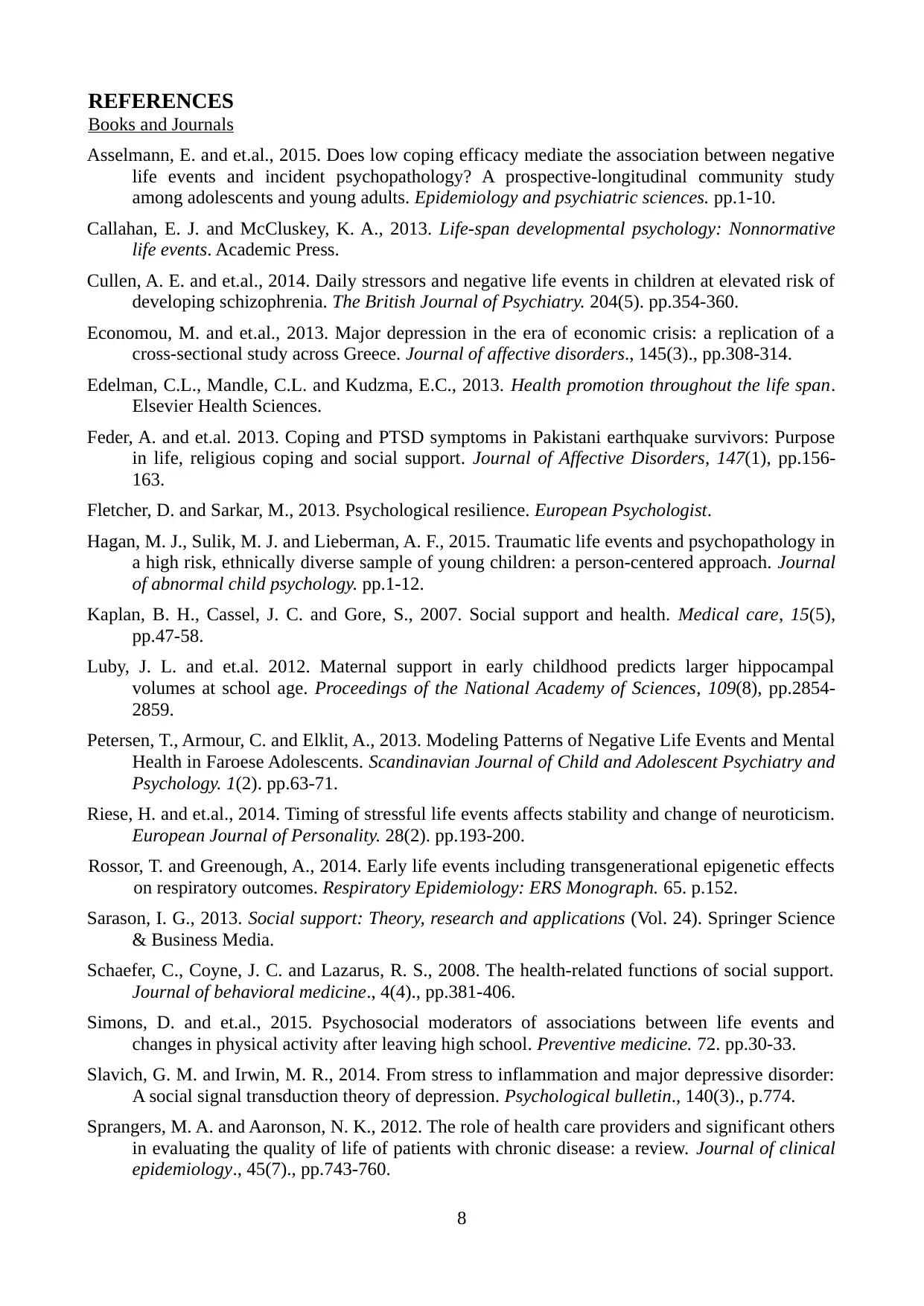
REFERENCES
Books and Journals
Asselmann, E. and et.al., 2015. Does low coping efficacy mediate the association between negative
life events and incident psychopathology? A prospective-longitudinal community study
among adolescents and young adults. Epidemiology and psychiatric sciences. pp.1-10.
Callahan, E. J. and McCluskey, K. A., 2013. Life-span developmental psychology: Nonnormative
life events. Academic Press.
Cullen, A. E. and et.al., 2014. Daily stressors and negative life events in children at elevated risk of
developing schizophrenia. The British Journal of Psychiatry. 204(5). pp.354-360.
Economou, M. and et.al., 2013. Major depression in the era of economic crisis: a replication of a
cross-sectional study across Greece. Journal of affective disorders., 145(3)., pp.308-314.
Edelman, C.L., Mandle, C.L. and Kudzma, E.C., 2013. Health promotion throughout the life span.
Elsevier Health Sciences.
Feder, A. and et.al. 2013. Coping and PTSD symptoms in Pakistani earthquake survivors: Purpose
in life, religious coping and social support. Journal of Affective Disorders, 147(1), pp.156-
163.
Fletcher, D. and Sarkar, M., 2013. Psychological resilience. European Psychologist.
Hagan, M. J., Sulik, M. J. and Lieberman, A. F., 2015. Traumatic life events and psychopathology in
a high risk, ethnically diverse sample of young children: a person-centered approach. Journal
of abnormal child psychology. pp.1-12.
Kaplan, B. H., Cassel, J. C. and Gore, S., 2007. Social support and health. Medical care, 15(5),
pp.47-58.
Luby, J. L. and et.al. 2012. Maternal support in early childhood predicts larger hippocampal
volumes at school age. Proceedings of the National Academy of Sciences, 109(8), pp.2854-
2859.
Petersen, T., Armour, C. and Elklit, A., 2013. Modeling Patterns of Negative Life Events and Mental
Health in Faroese Adolescents. Scandinavian Journal of Child and Adolescent Psychiatry and
Psychology. 1(2). pp.63-71.
Riese, H. and et.al., 2014. Timing of stressful life events affects stability and change of neuroticism.
European Journal of Personality. 28(2). pp.193-200.
Rossor, T. and Greenough, A., 2014. Early life events including transgenerational epigenetic effects
on respiratory outcomes. Respiratory Epidemiology: ERS Monograph. 65. p.152.
Sarason, I. G., 2013. Social support: Theory, research and applications (Vol. 24). Springer Science
& Business Media.
Schaefer, C., Coyne, J. C. and Lazarus, R. S., 2008. The health-related functions of social support.
Journal of behavioral medicine., 4(4)., pp.381-406.
Simons, D. and et.al., 2015. Psychosocial moderators of associations between life events and
changes in physical activity after leaving high school. Preventive medicine. 72. pp.30-33.
Slavich, G. M. and Irwin, M. R., 2014. From stress to inflammation and major depressive disorder:
A social signal transduction theory of depression. Psychological bulletin., 140(3)., p.774.
Sprangers, M. A. and Aaronson, N. K., 2012. The role of health care providers and significant others
in evaluating the quality of life of patients with chronic disease: a review. Journal of clinical
epidemiology., 45(7)., pp.743-760.
8
Books and Journals
Asselmann, E. and et.al., 2015. Does low coping efficacy mediate the association between negative
life events and incident psychopathology? A prospective-longitudinal community study
among adolescents and young adults. Epidemiology and psychiatric sciences. pp.1-10.
Callahan, E. J. and McCluskey, K. A., 2013. Life-span developmental psychology: Nonnormative
life events. Academic Press.
Cullen, A. E. and et.al., 2014. Daily stressors and negative life events in children at elevated risk of
developing schizophrenia. The British Journal of Psychiatry. 204(5). pp.354-360.
Economou, M. and et.al., 2013. Major depression in the era of economic crisis: a replication of a
cross-sectional study across Greece. Journal of affective disorders., 145(3)., pp.308-314.
Edelman, C.L., Mandle, C.L. and Kudzma, E.C., 2013. Health promotion throughout the life span.
Elsevier Health Sciences.
Feder, A. and et.al. 2013. Coping and PTSD symptoms in Pakistani earthquake survivors: Purpose
in life, religious coping and social support. Journal of Affective Disorders, 147(1), pp.156-
163.
Fletcher, D. and Sarkar, M., 2013. Psychological resilience. European Psychologist.
Hagan, M. J., Sulik, M. J. and Lieberman, A. F., 2015. Traumatic life events and psychopathology in
a high risk, ethnically diverse sample of young children: a person-centered approach. Journal
of abnormal child psychology. pp.1-12.
Kaplan, B. H., Cassel, J. C. and Gore, S., 2007. Social support and health. Medical care, 15(5),
pp.47-58.
Luby, J. L. and et.al. 2012. Maternal support in early childhood predicts larger hippocampal
volumes at school age. Proceedings of the National Academy of Sciences, 109(8), pp.2854-
2859.
Petersen, T., Armour, C. and Elklit, A., 2013. Modeling Patterns of Negative Life Events and Mental
Health in Faroese Adolescents. Scandinavian Journal of Child and Adolescent Psychiatry and
Psychology. 1(2). pp.63-71.
Riese, H. and et.al., 2014. Timing of stressful life events affects stability and change of neuroticism.
European Journal of Personality. 28(2). pp.193-200.
Rossor, T. and Greenough, A., 2014. Early life events including transgenerational epigenetic effects
on respiratory outcomes. Respiratory Epidemiology: ERS Monograph. 65. p.152.
Sarason, I. G., 2013. Social support: Theory, research and applications (Vol. 24). Springer Science
& Business Media.
Schaefer, C., Coyne, J. C. and Lazarus, R. S., 2008. The health-related functions of social support.
Journal of behavioral medicine., 4(4)., pp.381-406.
Simons, D. and et.al., 2015. Psychosocial moderators of associations between life events and
changes in physical activity after leaving high school. Preventive medicine. 72. pp.30-33.
Slavich, G. M. and Irwin, M. R., 2014. From stress to inflammation and major depressive disorder:
A social signal transduction theory of depression. Psychological bulletin., 140(3)., p.774.
Sprangers, M. A. and Aaronson, N. K., 2012. The role of health care providers and significant others
in evaluating the quality of life of patients with chronic disease: a review. Journal of clinical
epidemiology., 45(7)., pp.743-760.
8
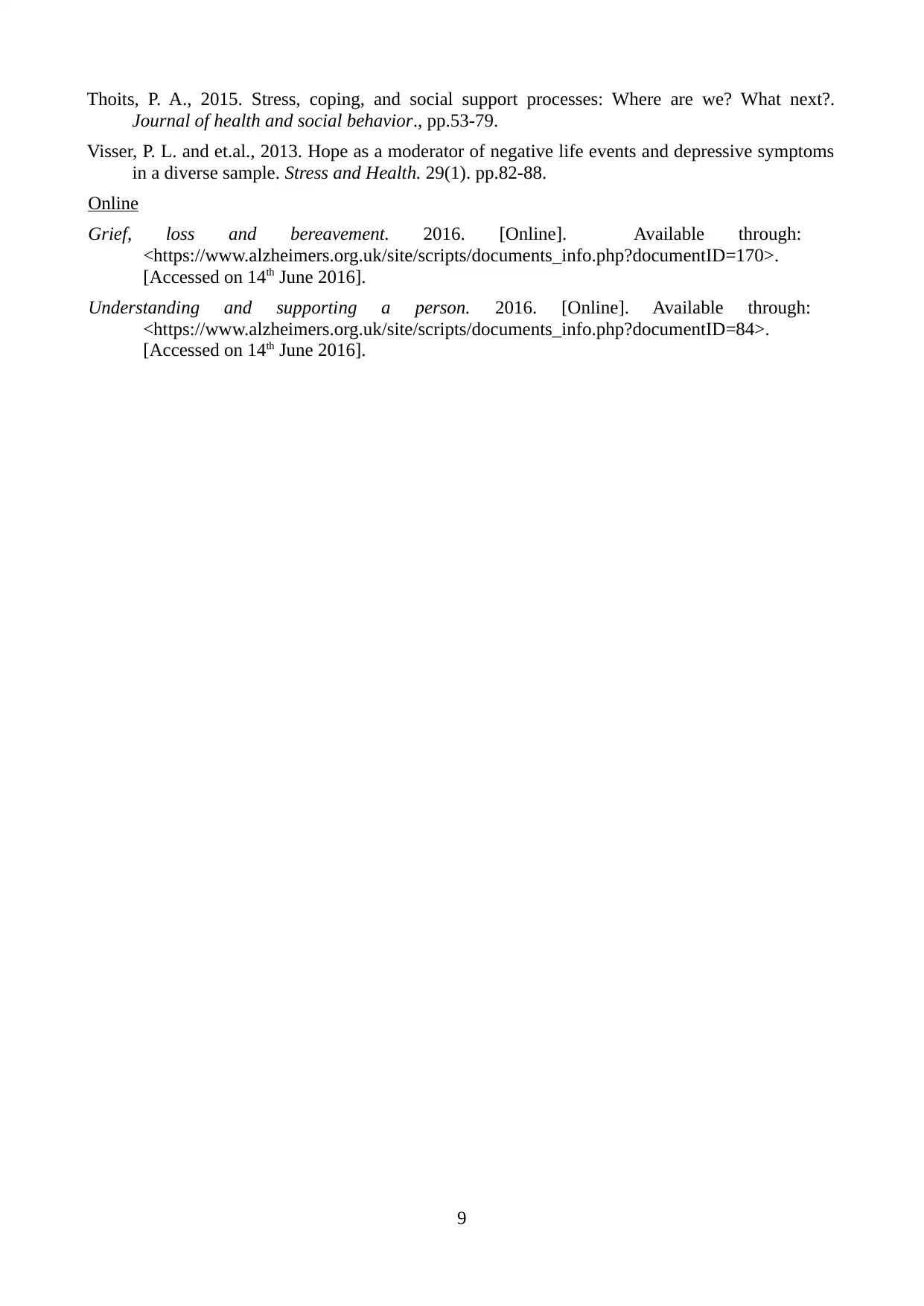
Thoits, P. A., 2015. Stress, coping, and social support processes: Where are we? What next?.
Journal of health and social behavior., pp.53-79.
Visser, P. L. and et.al., 2013. Hope as a moderator of negative life events and depressive symptoms
in a diverse sample. Stress and Health. 29(1). pp.82-88.
Online
Grief, loss and bereavement. 2016. [Online]. Available through:
<https://www.alzheimers.org.uk/site/scripts/documents_info.php?documentID=170>.
[Accessed on 14th June 2016].
Understanding and supporting a person. 2016. [Online]. Available through:
<https://www.alzheimers.org.uk/site/scripts/documents_info.php?documentID=84>.
[Accessed on 14th June 2016].
9
Journal of health and social behavior., pp.53-79.
Visser, P. L. and et.al., 2013. Hope as a moderator of negative life events and depressive symptoms
in a diverse sample. Stress and Health. 29(1). pp.82-88.
Online
Grief, loss and bereavement. 2016. [Online]. Available through:
<https://www.alzheimers.org.uk/site/scripts/documents_info.php?documentID=170>.
[Accessed on 14th June 2016].
Understanding and supporting a person. 2016. [Online]. Available through:
<https://www.alzheimers.org.uk/site/scripts/documents_info.php?documentID=84>.
[Accessed on 14th June 2016].
9
1 out of 9
Related Documents
Your All-in-One AI-Powered Toolkit for Academic Success.
+13062052269
info@desklib.com
Available 24*7 on WhatsApp / Email
![[object Object]](/_next/static/media/star-bottom.7253800d.svg)
Unlock your academic potential
© 2024 | Zucol Services PVT LTD | All rights reserved.





